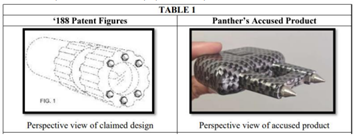Wrongheaded patent litigation conduct has consequences. Following a recent decision from the Federal Circuit, PS Products Inc. (PSP) and its counsel will be paying over $50,000 in attorney fees and sanctions to Panther Trading Co. because of dubious litigation conduct. The Eastern District of Arkansas considered the underlying case as exceptional under 35 U.S.C. § 285 because of PSP’s bad faith conduct during litigation. PSP alleged infringement of its U.S. Design Patent No. D680,188, directed to a long-spiked electrode for a stun device, against Panther. The accused Panther device was unquestionably distinct from the patented design. Therefore Panther responded by serving a Rule 11 letter explaining that (1) the infringement allegations were frivolous because the designs were plainly dissimilar, and (2) venue was statutorily improper. PSP did not respond.
Soon after, Panther discovered a prior art marketing brochure from PSP depicting a design nearly identical to the claimed design. So Panther served a second letter to demand that the lawsuit be dismissed based on the found prior art. Again, Panther did not respond. But it did move to voluntarily dismiss the case with prejudice. In response, Panther served a third letter to demand reimbursement for its attorney fees and expenses incurred defending against the lawsuit. Panther advised that denial of reimbursement would lead to a motion for sanctions. Following dismissal, Panther filed a motion for attorney fees and costs under 35 U.S.C. § 285 and $100,000 in deterrence sanctions under the court’s inherent power. The district court found the case exceptional under § 285 and granted Panther’s motion for attorney fees and costs totaling $43,344.88. PSP and its counsel were held jointly and severally liable and were ordered to pay $25,000 in deterrence sanctions to the court. The court subsequently denied reconsideration of the deterrence sanctions.
The Federal Circuit considered a few issues on appeal—all of which generally involved whether the district court erred in awarding an additional $25,000 in sanctions under its inherent power. First, the Federal Circuit explained that the district court correctly imposed deterrence sanctions even though it had already awarded attorney fees and costs under 35 U.S.C. § 285. Attorney fees and costs under § 285 would not preclude a district court from separately imposing sanctions or fees under another authority. Next, the Federal Circuit analyzed the district court’s findings of PSP’s lack of legal merit of the action and PSP’s litigious history of filing meritless lawsuits in Arkansas. Notably, the claimed design and accused product were characterized as so obviously dissimilar that the Federal Circuit diplomatically considered this case a “nuisance suit.”

And PSP improperly cited the general venue statute, 28 U.S.C. § 1391, rather than the more appropriate patent-specific venue statute, 28 U.S.C. § 1400. Under the proper analysis of 28 U.S.C. § 1400(b), Panther did not reside or have a regular and established place of business in Arkansas. In addition, the Federal Circuit addressed PSP’s litigation history in the Eastern District of Arkansas, noting that PSP had filed 25 patent infringement lawsuits. Of those cases, more than half were voluntarily dismissed before or soon after answers were filed. And all 25 complaints incorrectly asserted the wrong venue statute. Finally, the Federal Circuit dismissed PSP’s argument that the district court abused its discretion in imposing sanctions under its inherent power. Importantly, the sanctions were based not only on PSP’s litigation history, but also on its history is of filing meritless lawsuits.
Even though the Federal Circuit denied Panther’s request for attorney fees and costs in defending this frivolous appeal, the Federal Circuit says it was a “close case.” One reading is that the case may have been wrongheaded, but not frivolous. This is not the first time a district court penalized egregious behavior exhibited by patent trolls. See Cedar Lane Techs. Inc. v. Blackmagic Design Inc., No. 20-cv-1302, 2020 WL 6789711 (N.D. Cal. Nov. 19, 2020) (ordering sanctions under Rule 11 after Cedar Lane’s attorney made frivolous arguments in defense of Rule 15 violations); VDPP v. Volkswagen Group of America, No. H-23-2961 (S.D. Tex. July 11, 2024) (awarding attorney fees under 35 U.S.C. § 285 where VDPP’s positions were frivolous and unreasonable, and its legal theories were flawed). Perhaps the take-home message here is that patentees and their counsel should follow the basic patent litigation practices and exercise sound common sense, or else face the consequences for choosing to do otherwise.
